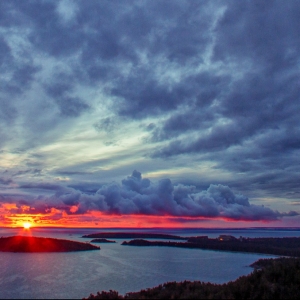The Stream, December 9, 2021: Clashes Over Water Scarcity in Cameroon Leave Nineteen Dead
YOUR GLOBAL RUNDOWN
- New research detects microplastics in every tested body of water in Oregon.
- Clashes over water scarcity in Cameroon leave nineteen dead and dozens more wounded.
- A water company in the U.K. is fined for illegal sewage discharges.
- President Biden seeks to revoke permits for a controversial water pipeline in California.
Indigenous groups in Canada feel caught between two environmental risks.
“We don’t want to swap one environmental liability, which is the tailings ponds at the moment, for another.”—Bori Arrobo, Fort McKay First Nation’s director of sustainability. Canada’s federal government has begun developing regulations that would allow oilsands companies to treat and then release its wastewater back into the environment, CBC reports. Companies are currently required to store all water used to extract oil in aboveground “tailings ponds.” The risks of leakage and dam failure increase as these ponds grow; but indigenous groups fear that releasing the tailings could contaminate their land and drinking water.
IN RECENT WATER NEWS
In Case You Missed It:
As West Withers Corporations Consolidate Land and Water Rights – With farms, ranches and rural communities facing unprecedented threats, a worrying trend leads to a critical question: Who owns the water? This piece was originally published by Columbia Insight as part of Tapped Out, a series documenting power and water justice in the rural American West.
HotSpots H2O: Ongoing Madagascar Famine Is Driven By Poverty, Not Climate Change – A new study shows the vulnerability of the world’s poorest nations even without climate breakdowns, its authors say.
In Oregon, Microplastics Detected in Every Tested Body of Water
New research has detected microplastics in each of 30 Oregon waterways that were tested. The study, performed by the Environment Oregon Research & Policy Center, found traces of the contaminant in urban and remote waterways alike. Microplastics are pieces of plastic each smaller than a grain of rice, which are known to harm aquatic life and enter the human food chain. The report recommended several policy measures to curb plastic production in Oregon. At present, there is no state or federal requirement to test for microplastics, nor to limit their concentrations, in waterways or drinking water.
TODAY’S TOP WATER STORIES, TOLD IN NUMBERS
19 MORTALITIES
Skirmishes over water shortages in northern Cameroon broke out on Monday, killing nineteen people and wounding many more. The ethnic clashes erupted between Mousgoum fishermen, who create dams to divert water and lure their catch, and Arab Choa cattle ranchers, who take their livestock for watering in the same location. The incident occurred four months after a similar conflict caused 11,000 civilians to flee into neighboring Chad.
360,000 LITERS OF RAW SEWAGE
A water company in the U.K. has been fined £1.5 million ($1.9 million) for illegally dumping over 360,000 liters (95,102 gallons) of raw sewage into a Worcestershire waterway. Lawyers with the U.K. Environment Agency argued that the company failed to respond promptly to alarms that the leak had occurred. An agency official called the incident “preventable” and “completely unacceptable.”
ON THE RADAR
Laura Gersony covers water policy, infrastructure, and energy for Circle of Blue. She also writes FRESH, Circle of Blue’s biweekly digest of Great Lakes policy news, and HotSpots H2O, a monthly column about the regions and populations most at-risk for water-related hazards and conflict. She is an Environmental Studies and Political Science major at the University of Chicago and an avid Lake Michigan swimmer.






Leave a Reply
Want to join the discussion?Feel free to contribute!